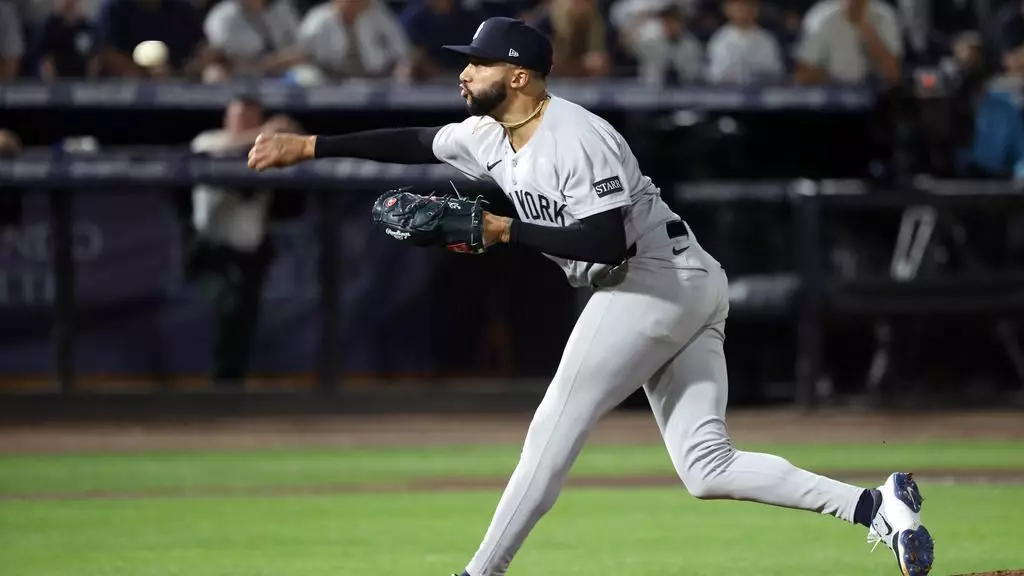Devin Williams, the New York Yankees’ recent addition from the Milwaukee Brewers, is a player under scrutiny. With only a few weeks into his tenure with the Yankees, Williams is struggling to replicate the success that earned him All-Star status just last season. Following a heartbreaking loss to the Tampa Bay Rays, in which the Yankees squandered a lead in dramatic fashion, Williams’s performance has drawn significant attention and concern. This scrutiny serves as a reminder of the pressures faced by athletes, especially when transitioning into a high-stakes environment like New York City.
Williams, despite being heralded as a dominant closer, currently sits with a staggering 9.00 ERA and has struggled with walks, allowing opponents to hit at an alarming .333 average against him. His brief time in New York has been marked by inconsistency; the promise shown in his previous season has yet to manifest. While he managed to achieve saves when called upon, four of those came under pressure-filled situations that now seem a distant memory amid the current chaotic circumstances.
Challenges on the Mound
What is particularly concerning is Williams’s inability to harness control, which has been crucial for his role. Having walked seven batters in just eight innings poses serious questions about his readiness to adapt to the intense atmosphere surrounding the Yankees. The notion that Williams may have to adjust further given the expectations of the franchise looms large. Such struggles beg the question of whether he can recapture the innovative pitching style that made him a formidable force last season.
Aaron Boone, the Yankees’ manager, remains hopeful, acknowledging that Williams possesses the tools necessary to navigate through challenging times. Nevertheless, Boone’s optimism may not be enough to quell the anxieties surrounding Williams’s performances and his ability to deliver in high-pressure situations. The Yankees’ fanbase thrives on success, and any misstep can amplify the scrutiny faced by key players.
The recent outing against the Rays highlighted a particularly unfortunate series of events—Williams’s error in judgment and execution on the mound led to a four-run ninth inning, ultimately sealing the Yankees’ fate. The game saw an unraveling that is emblematic of Williams’s current predicament. His choice of pitches, particularly a changeup against Brandon Lowe, has been pointed out as a critical misstep and highlights a potential overuse of this pitch. The fact that he managed to induce only one swing-and-miss among seven attempts is disconcerting and hints at a lack of confidence that could undermine his future performances.
Luke Weaver: An Alternative Option?
With Williams’s struggles becoming increasingly evident, the Yankees must also consider alternative options for the closer role. Luke Weaver’s perfect eighth inning against the Rays showcased his potential, as he has not allowed a run in 11 innings over nine appearances this year. Weaver’s emergence could be a saving grace for the Yankees should Williams continue to face roadblocks.
Acquired in a significant trade with the Brewers, the pressure on Williams increases each day he falters, especially with the added performance of Weaver looming in the background. The situation raises questions about the Yankees’ decision-making in roster management and player deployment, grappling with the balance of giving Williams the opportunity to reclaim his former glory while simultaneously ensuring that the team remains competitive.
The Psychology of Performance
The core of Williams’s struggles also speaks volumes about the psychology of a professional athlete. The stigma that follows a drop in performance can be debilitating for a player who was once revered. The weight of expectations can have a profound impact on an athlete’s mindset, affecting everything from pitch selection to overall confidence. In high-pressure markets like New York, the transition can be an emotional rollercoaster, often leading to volatility in performance.
Williams’s session of self-reflection after his recent performance is a crucial aspect of his journey. Recognizing the need to adjust and learn from mistakes is paramount. Whether he can overcome this significant hurdle—the ability to trust his pitch arsenal again in such a rigid environment—remains unanswered.
Nonetheless, there’s an irrefutable belief in his talent. The baseball community often provides an environment for second chances, learning curves, and adaptation. It will be fascinating to watch how Williams navigates these turbulent waters, with the hopes of fans riding on his performance moving forward.

